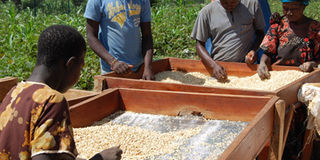Why farmers always buy seed

In some cases the offspring may not be so identical to the parent plants. Plant breeders select pollen from plants with particular characteristics and transfer it to other well identified plants to come up with the seed of the desired quality. FILE PHOTO
What you need to know:
- Nowadays due to markets demands and the need to increase agricultural production and household food security, farmers are compelled to get the best seed.
- Yet not all farmers can make hybrid seed, nor can all of them produce clones for such crops as coffee. They cannot unite a scion to a root stock to come up with a grafted plant. So to meet the present day varied food demands, farmers must have a budget for buying seed.
Traditionally when a farmer harvested a crop some of it would be saved as seed for planting in the next rain season.
When a farmer noticed that a neighbour had good beans, he would request for some to plant.
Farmers select seed for different reasons such as good taste, resistance to disease, yield capacity, nutritional value, and drought tolerance, among others.
Crop production is largely about seed selection and development by farmers and plant breeders in order to come up with good harvests.
The traditional practice of saving seed or getting free seed from friends and relatives is however disappearing with the arrival of quality seed of superior varieties from professional seed breeders and seed companies.
We were taught in biology that a seed is formed when female (ovule) and male gametes (pollen) unite in a process called fertilization. In plants this is sexual reproduction.
Some plants are self-pollinated while others are cross pollinated. The offspring (seed) may have characteristics similar to the parent plants.
In some cases the offspring may not be so identical to the parent plants. Plant breeders select pollen from plants with particular characteristics and transfer it to other well identified plants to come up with the seed of the desired quality.
Another form of seed formation is described as asexual propagation and it involves the use of vegetative parts to perpetuate a new plant. Cassava, sweet potatoes and bananas are propagated in this way.
Vegetative propagation has the best chance of producing a crop that is identical to the parent plant. Some plants obtained from vegetative parts are called clones. Sometimes breeders unite separate stems to produce grafted plants.
Nowadays due to markets demands and the need to increase agricultural production and household food security, farmers are compelled to get the best seed.
Yet not all farmers can make hybrid seed, nor can all of them produce clones for such crops as coffee. They cannot unite a scion to a root stock to come up with a grafted plant. So to meet the present day varied food demands, farmers must have a budget for buying seed.




